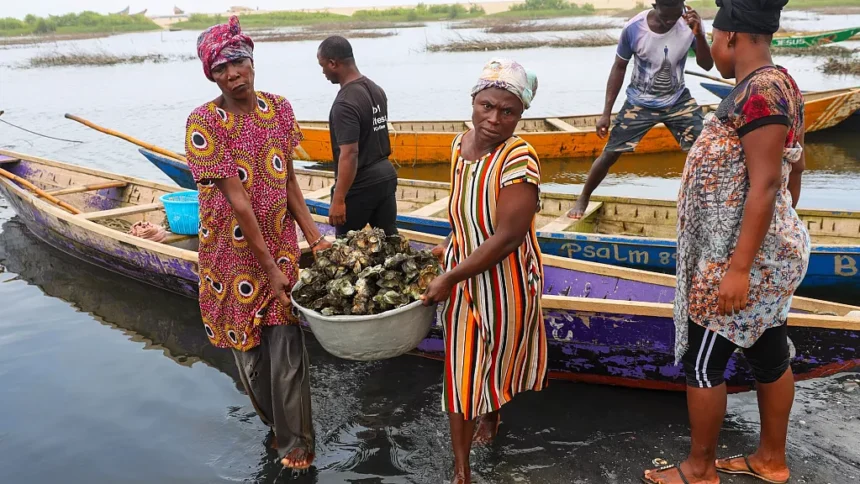Every day, Beatrice Nutekpor picks oysters to sell by weaving through the mangroves. Oyster farming, which women have long dominated, is a major source of income in Ghana’s coastal mangroves.
In an effort to mitigate the effects of climate change, hundreds of women received training in environmentally friendly oyster farming techniques, such as planting and preserved mangroves and selective oyster harvesting.
“Previously the oysters attached themselves to the mangroves, but because the mangroves have been cut, now they settle in the water,” Nutekpor explained.
“The oysters have started attaching themselves to the mangroves we have planted. We also harvest the fish that hides in the roots of the mangroves, so the mangroves are very good for us,” she added.
She started the family custom when she was fifteen years old.
It is difficult for her to continue the practice and teach it to her daughter now that she is 45.
“Just as my mother taught me this business, I also want to teach my daughter so that she could also teach her child, then oyster farming will become our family’s business,” She states.
In the aquatic ecosystem, mangrove trees or bushes that grow along coastlines play a vital multipurpose role. They protect the land during storms and cyclones, foster fish habitat, and act as a buffer against coastal erosion caused by rising sea levels.
But when U.S. President Donald Trump decided to reduce foreign aid contracts, the non-profit Development Action Association lost its U.S. aid, and its training came to a stop.
As Ghana emerges from its greatest economic crisis in decades, it is up to the women to preserve their generational customs and provide for their families.
Breeding oysters in a regulated aquatic environment for commercial use is known as oyster farming.
Development and climate change have caused Ghana, like the other coastal West African countries, to lose a large percentage of its mangroves.
Although data on recent depletion is unavailable, more than 80% of the original mangroves have disappeared in the past century.
As sea levels rise and global temperatures rise, mangroves are likewise becoming more and more threatened by climate change.
Nutekpor sells only enough oysters to support her family and send her girls to school, with a single basin selling for about 47 Ghanaian cedis ($4).
People’s depletion of mangroves for firewood has led to development creeping into coastal areas and officials releasing water from overflowing dams, putting the forests at risk.
According to Development Action Association Community Liaison Officer Promise Hunya, the USAID project made the community more aware of the importance of mangroves to the ecosystem.
“At first, we didn’t know the importance of the mangroves, and through the USAID project, they brought us a student from Cape Coast University to teach us how important the mangrove is.” He says.
Due to the loss of mangroves, farmers like Nutekpor must risk their lives by free diving for hours at a depth of 30 feet (9 meters) or more in pursuit of oysters, which migrate to deeper water when mangrove roots are absent.
The estuary’s oysters have an ecological function. Francis Nunoo, a professor of fisheries science at the University of Ghana, states, “If we have more oysters in a water body, in any mangrove area, it’s found that the water gets cleaner than before”.
The women have reaped the benefits of replanting the mangroves, but it is a backbreaking task that exposes them to the intense sun for hours on end.
Nunoo thinks it’s time for the ladies to pursue other sources of income.
“The reliance of the coastal people on these ecosystems is heavy. So I would also add that we should intentionally find alternative livelihoods for them to help reduce the heavy reliance on the mangrove ecosystem, oysters and all the fish and other things that we have, because we have a situation where if you don’t take care, the rate of destruction is always higher than the rate of repopulation. We are going to lose some species, and we are going to lose some lives.” He emphasised.
Source: Africa News






